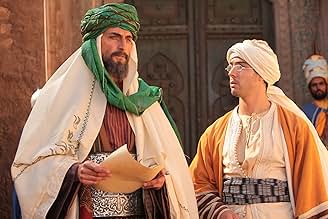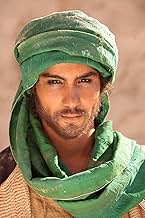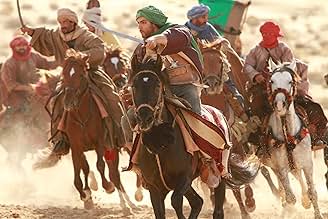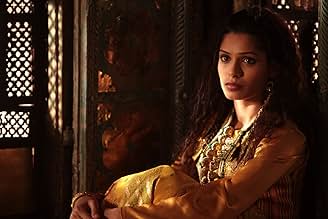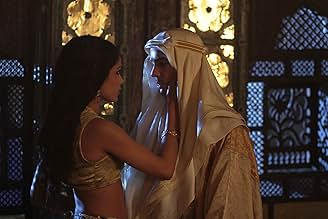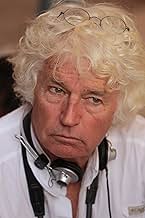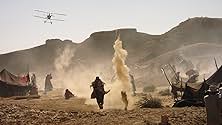Set in the 1930s Arab states at the dawn of the oil boom, the story centers on a young Arab prince torn between allegiance to his conservative father and his modern, liberal father-in-law.Set in the 1930s Arab states at the dawn of the oil boom, the story centers on a young Arab prince torn between allegiance to his conservative father and his modern, liberal father-in-law.Set in the 1930s Arab states at the dawn of the oil boom, the story centers on a young Arab prince torn between allegiance to his conservative father and his modern, liberal father-in-law.
- Awards
- 1 nomination total
6.613K
1
2
3
4
5
6
7
8
9
10
Featured reviews
Great film..
Directed by Jean-Jacques Annaud Set in the 1930s Arab states at the dawn of the oil boom, the story centers on a young Arab prince torn between allegiance to his conservative father and modern, liberal father-in-law (plot), it is the highest budget Arabian related film since LAWRENCE OF ARABIA (1962) and was one of the most anticipated film events in the international film community this season, despite the hype, however, the film was met with mixed reviews after the press screening and premier. Expectations were high and while many were left dissatisfied, others rated it a smashing success as it apparently followed the book to a tee, I have not read the book so perhaps I am missing something, but being that I have seen a number of impressive films of late that were made for under the $1 million mark, BLACK GOLD felt like a significant letdown with its $55 million production price-tag and lackluster deliverance.
The highlight of the film was a fantastic performance by lead role Tahar Rahim (A PROPHET, 2009), his soulful eyes and magnetic vulnerability can work in any film whether speaking or just looking into the camera sans dialogue. Mark Strong also plays a great bearded royal Arabian Sultan Amar, even though he speaks with a distinguishable British accent. The roles that threw the film off were those of Antonio Banderas and Freida Pinto. It is almost impossible to watch Banderas play Bedouin Sheik Nassib without constantly being reminded that he is, in fact, Antonio Banderas. Freida Pinto lends the film her stunning Indian looks as Princess Leyla, but unfortunately her dialogue consists of cliché one-liners that might have saved the movie if not uttered; of course bad film writing is bad writing however delivered.
3,5/5
The highlight of the film was a fantastic performance by lead role Tahar Rahim (A PROPHET, 2009), his soulful eyes and magnetic vulnerability can work in any film whether speaking or just looking into the camera sans dialogue. Mark Strong also plays a great bearded royal Arabian Sultan Amar, even though he speaks with a distinguishable British accent. The roles that threw the film off were those of Antonio Banderas and Freida Pinto. It is almost impossible to watch Banderas play Bedouin Sheik Nassib without constantly being reminded that he is, in fact, Antonio Banderas. Freida Pinto lends the film her stunning Indian looks as Princess Leyla, but unfortunately her dialogue consists of cliché one-liners that might have saved the movie if not uttered; of course bad film writing is bad writing however delivered.
3,5/5
What a delight! My guilty pleasure of the year and I don't care who knows it.
I remember when Lawrence of Arabia came out, long ago. The most stunning things about it were Peter O'Toole, the haunting music, and the hard won shots of the desert. I would have traded it all to learn the details of desert warfare, but it failed to do more than offer a glimpse. Instead it wallowed in Lawrence's tortured mind to little purpose, creating a deeply dissatisfying movie. Now, years later, my antidote has come in the form of a real story, the kind I longed for as a kid, but seldom found.
If you consider the people of the Arabian desert savage, superstitious barbarians, you won't be able to enjoy this movie. But if you can suspend your prejudice long enough to be convinced, they do a fine job of conveying how a totally foreign and ancient culture can make more than a little sense in today's world.
Is it all fantasy, these unusually noble men with their deep distrust of western values? I doubt it. There are always ineffable things about a people's true dreams and character that have little to do with their actual history, that can only really be expressed in art. If I were Arab I'd be very happy to see a movie like this about how my forefathers reacted to the first oil wells and the riches they promised.
The lead, Tahar Rahim, is spot on as the bookish Prince Auda, turned fighter. His father Mark Strong as the Sultan Amar has some of the best lines and is a strong and welcome presence throughout. Antonio Banderas worked for me as Emir Nesib and I admire his entire career. There's no doubt in my mind he was fully committed to this movie though some apparently found his performance distracting; I did not. As others have pointed out, Freida Pinto and Liya Kebede, as the female leads, are both fairly wasted here though there's something true about how minor their roles are given this is mostly a story about change, war and father-son relations.
No, I might forever be labeled a low brow for writing this, but I enjoyed this film much more than I did the highly acclaimed Lawrence of Arabia. This is a far more earnest and effecting film and deserves a great deal more praise than it's likely to get in the west given our politics. That's truly a shame as we could use a little sympathy and insight into these people.
If you consider the people of the Arabian desert savage, superstitious barbarians, you won't be able to enjoy this movie. But if you can suspend your prejudice long enough to be convinced, they do a fine job of conveying how a totally foreign and ancient culture can make more than a little sense in today's world.
Is it all fantasy, these unusually noble men with their deep distrust of western values? I doubt it. There are always ineffable things about a people's true dreams and character that have little to do with their actual history, that can only really be expressed in art. If I were Arab I'd be very happy to see a movie like this about how my forefathers reacted to the first oil wells and the riches they promised.
The lead, Tahar Rahim, is spot on as the bookish Prince Auda, turned fighter. His father Mark Strong as the Sultan Amar has some of the best lines and is a strong and welcome presence throughout. Antonio Banderas worked for me as Emir Nesib and I admire his entire career. There's no doubt in my mind he was fully committed to this movie though some apparently found his performance distracting; I did not. As others have pointed out, Freida Pinto and Liya Kebede, as the female leads, are both fairly wasted here though there's something true about how minor their roles are given this is mostly a story about change, war and father-son relations.
No, I might forever be labeled a low brow for writing this, but I enjoyed this film much more than I did the highly acclaimed Lawrence of Arabia. This is a far more earnest and effecting film and deserves a great deal more praise than it's likely to get in the west given our politics. That's truly a shame as we could use a little sympathy and insight into these people.
A Visually Ambitious, Yet Stilted Epic
Jean-Jacques Annaud's "Day of the Falcon" (also known as "Black Gold") attempts to deliver an epic historical drama set against the backdrop of the Arabian oil boom. While the film boasts undeniably stunning cinematography, capturing the vast beauty of the desert landscapes, and features an ambitious scope with large-scale battle sequences, its narrative often struggles. The dialogue can feel stilted and unnatural, and the performances, despite a talented international cast including Antonio Banderas and Mark Strong, sometimes lack the necessary emotional depth to fully engage the audience. The pacing can be uneven, and the film's attempt to blend historical commentary with a personal love story occasionally feels forced, resulting in a visually impressive but ultimately less impactful cinematic experience.
Is it worth watching? If you appreciate grand historical visuals and sweeping desert epics, it might offer some enjoyment. However, if you prioritize strong character development, natural dialogue, and a consistently engaging plot, you might find it a somewhat tedious watch.
Is it worth watching? If you appreciate grand historical visuals and sweeping desert epics, it might offer some enjoyment. However, if you prioritize strong character development, natural dialogue, and a consistently engaging plot, you might find it a somewhat tedious watch.
one of the best movies about Arabia since 'lawrence of Arabia'
i was deeply moved and excited by this great movie. finally, there's a movie that told us how the kingdom of Saudi Arabia was built. this is a movie not only gave us great scenes of the desert, the people and one of the greatest fighting scene since 'lawrence of Arabia', but also gave us some great love romance between the two younger generations of the Saudi reigning tribes, their loyalty and their faith to each other during the turmoil time. there was also a beautiful romantic touch from that beautiful exquisite free-will young woman from the southern tribe, she not only saved the future king, helped him regaining the land but also left him with a forever nostalgic memory.
the casting did a great job signed up two great actors to play the foe against each other. the development of the young hostage son from a geeky bookworm nerd to a great man with a vision for its land and its future was also very well crafted.
too shame that the extremity of the strong belief of the Muslim religion didn't free that country but enslaved it later with tyranny and totalitarianism. but for this movie itself, this outcome was not what the screenplay and the director really wanted to portray in the first place. what they've tried to tell by this movie were love, loyalty, truthfulness and humanity before that black gold buried and suffocated the whole country's past and future. its later corrution and cruelty of the house of the saud were not included in what they wanted to tell in this particular movie.
this is a wonderful and fantastic film with great cinematography and sound track. an almost perfect romantic saga.
the casting did a great job signed up two great actors to play the foe against each other. the development of the young hostage son from a geeky bookworm nerd to a great man with a vision for its land and its future was also very well crafted.
too shame that the extremity of the strong belief of the Muslim religion didn't free that country but enslaved it later with tyranny and totalitarianism. but for this movie itself, this outcome was not what the screenplay and the director really wanted to portray in the first place. what they've tried to tell by this movie were love, loyalty, truthfulness and humanity before that black gold buried and suffocated the whole country's past and future. its later corrution and cruelty of the house of the saud were not included in what they wanted to tell in this particular movie.
this is a wonderful and fantastic film with great cinematography and sound track. an almost perfect romantic saga.
Good intentions
Well the movie has only the best intentions I assume. It tries hard to be as politically correct as possible, while trying to show extremities and cultural differences. That doesn't work as good as the filmmakers might have expected. I think the tone is uneven, while it still may hold some surprises for some people I guess.
Some good acting is involved here and you get the beautiful Freida Pinto in a major role. You also get Riz Ahmed from Four Lions, who's repeating his comedic role (in another tone obviously, but still very funny of course). The sets are nice and you get a history lesson (more or less) from a region that some (most) of you may not know yet ...
Some good acting is involved here and you get the beautiful Freida Pinto in a major role. You also get Riz Ahmed from Four Lions, who's repeating his comedic role (in another tone obviously, but still very funny of course). The sets are nice and you get a history lesson (more or less) from a region that some (most) of you may not know yet ...
Did you know
- TriviaThe film was shot in Tunisia and Qatar. The battle scenes were shot in the deserts of Qatar and took over four weeks to shoot.
- Quotes
Prince Auda: God hates the things we do in His name. He hates that.
- ConnectionsFeatured in Projector: Black Gold (2012)
- SoundtracksI'm Sitting On The Top of The World
Written by Ray Henderson, Sam Lewis and Joe Young
- How long is Day of the Falcon?Powered by Alexa
Details
- Release date
- Countries of origin
- Official sites
- Language
- Also known as
- Vàng Đen
- Filming locations
- Empire Studios, Latrach, Tunisia(Studio)
- Production companies
- See more company credits at IMDbPro
Box office
- Budget
- €40,000,000 (estimated)
- Gross worldwide
- $5,452,142
- Runtime
- 2h 10m(130 min)
- Color
- Sound mix
- Aspect ratio
- 2.35 : 1
Contribute to this page
Suggest an edit or add missing content





